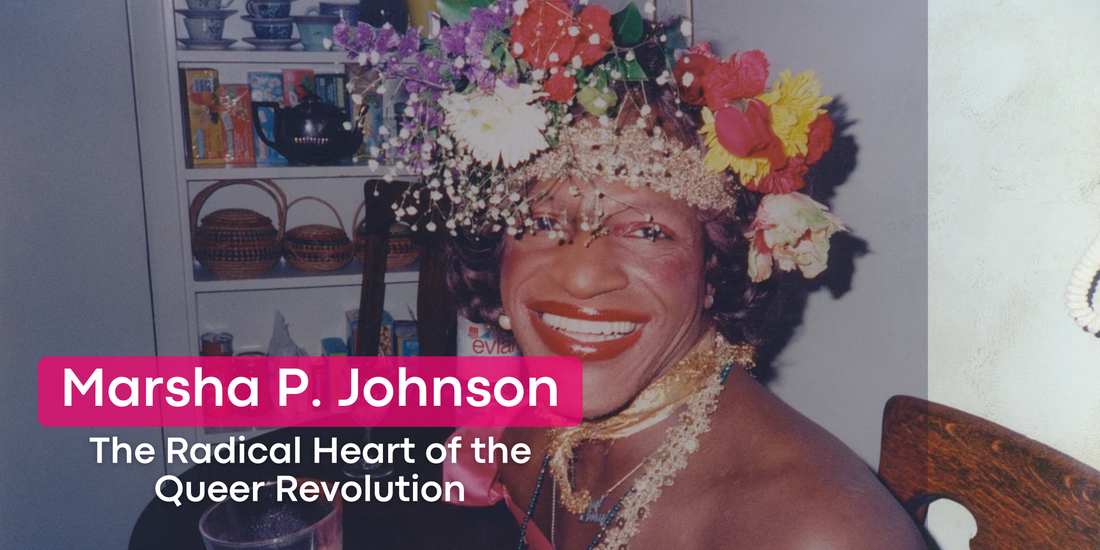Marsha P. Johnson: The Radical Heart of the Queer Revolution
At UNTAG, we believe that queer and trans stories – past and present – deserve to be seen, heard, and honoured. In this blog series, we highlight key historical figures whose lives and legacies continue to inspire LGBTQIA+ communities today.
By telling their stories, we aim to create space for reflection, recognition, and connection. Because queer history is history – and visibility matters.
One of the most powerful voices in that history is Marsha P. Johnson – a Black queer activist, drag performer, and trailblazer who fought for the rights of trans people, sex workers, and the unhoused. Her life reminds us that care is resistance, and joy can be radical.
Born in 1945 in New Jersey as Malcolm Michaels Jr., Marsha grew up in a conservative Christian household. From an early age, she felt different, but didn’t have the words to describe it. It wasn’t until she moved to New York City in the 1960s that she began living as Marsha P. Johnson – a self-described drag queen, street queen, activist, performer, and what today might be seen as a trans or non-binary person.
The “P” in her name? It stood for “Pay it no mind,” which was her go-to answer whenever people questioned her gender or existence. It was both witty and powerful – a way of reclaiming space without inviting conflict.
In a time when Black queer and trans people were routinely rejected by society – and often by their own LGBTQ+ communities – Marsha stood out as a source of light, strength, and defiance. Her style was flamboyant, her smile unforgettable, and her heart deeply committed to caring for those society had abandoned.
Stonewall and Becoming a Symbol
On June 28, 1969, a police raid on the Stonewall Inn triggered a spontaneous uprising led by queer people who had had enough of harassment and violence. Marsha was not there on the first night, as she herself stated – but she arrived soon after and played a visible role in the days of protest and organizing that followed.
She quickly became one of the most recognizable faces of the rebellion – not because she tried to take the spotlight, but because she represented everything the uprising was about: resistance by those at the very margins of society. Marsha was poor, Black, queer, trans, often unhoused, and criminalized for simply existing. Her presence in the protests, her refusal to disappear, and her fierce commitment to joy made her an icon.
But while the movement gained momentum, it often left people like Marsha behind. As white, cisgender gay men became the dominant voices in mainstream LGBTQ+ activism, Marsha and others like her were sidelined. That exclusion only made her more determined.
Creating Space: The Birth of STAR
Together with fellow activist Sylvia Rivera, Marsha co-founded STAR – Street Transvestite Action Revolutionaries – in 1970. STAR was both a political act and a practical solution: a shelter and organizing hub for trans youth, many of whom were homeless and living on the streets of New York.
At a time when few organizations cared about trans lives, STAR provided food, a bed, clothing, and love. It was radical care in action – built not with funding or official support, but with community resilience and survival instincts. STAR House was one of the first safe spaces for trans youth in the U.S., and its legacy lives on in today’s trans-led mutual aid networks.
A Death That Raised Questions
In July 1992, Marsha’s body was found floating in the Hudson River. Police quickly ruled her death a suicide and closed the case – despite reports of her being harassed shortly before her disappearance, and evidence that suggested possible foul play.
Friends and fellow activists refused to accept this. Marsha had been active and upbeat in the days leading up to her death, organizing and advocating as always. Her community immediately suspected that her death was not properly investigated because she was Black, poor, queer, and trans.
After years of public pressure, her case was reopened in 2012, two decades later. While the new investigation did not lead to clear answers, it brought renewed attention to the epidemic of violence against Black trans women – and to the ongoing failure of institutions to protect or even acknowledge their lives.
More Than a Myth, Still a Movement
Marsha P. Johnson wasn’t perfect. She didn’t try to be. She struggled with poverty, police brutality, and mental health issues – but she never stopped showing up for others. Her life wasn’t about fame or headlines. It was about survival, community, and joy – even when joy was an act of rebellion.
Her legacy isn’t only in history books or Pride parades. It lives in every mutual aid fund, every safe house, every protest chant demanding justice for Black trans lives.
Marsha reminded us – and still reminds us – that queer liberation must center those most excluded. That there can be no pride for some without liberation for all.
As she once said:
“How many years has it taken people to realize that we are all brothers and sisters and human beings in the human race?”




